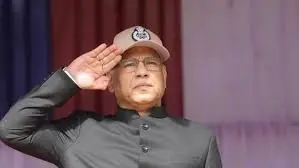Intelligence Bureau chief Tapan Kumar Deka gets a one-year extension

The Government of India has granted a one-year extension to Tapan Kumar Deka, the Chief of the Intelligence Bureau (IB). This decision, effective until June 2026 or until further orders, marks his second consecutive extension. It highlights the government’s trust in his leadership amid rising national security challenges.
Who is Tapan Kumar Deka?
Tapan Kumar Deka is a 1988 batch Indian Police Service (IPS) officer from the Himachal Pradesh cadre. He has over three decades of experience in intelligence and security. Before becoming the Director of the Intelligence Bureau in June 2022, he led the IB’s operations wing. This role put him at the center of India’s counter-terrorism efforts.
Throughout his career, Deka has focused on targeting cross-border terrorism and insurgencies. His work has helped counter Pakistan-based terror groups and extremist networks within India. His tenure has been praised for strategic depth and a firm stance on internal security.
What Does the Extension Mean?
The one-year extension for Deka comes under Fundamental Rule 56(d) and Rule 16(1A) of the All India Services (Death-cum-Retirement Benefits) Rules, 1958. These rules allow the government to keep officers beyond retirement age in the public interest.
By extending Deka’s term, the government aims to maintain steady leadership at the IB during a critical period. The IB plays a key role in gathering intelligence, countering terrorism, and ensuring internal security. Therefore, stable leadership is vital for ongoing operations and new threats.
The Role of the Intelligence Bureau
Founded in 1887, the Intelligence Bureau is India’s oldest intelligence agency. It operates under the Ministry of Home Affairs and handles domestic intelligence and counter-intelligence. Unlike the Research and Analysis Wing (RAW), which focuses on external threats, the IB works on internal security issues such as terrorism, espionage, and communal violence.
The IB has been essential in preventing terrorist attacks and managing insurgencies across India. Its importance has grown as threats like cyberterrorism and misinformation campaigns have emerged.
Leading the IB requires strong management skills and deep strategic knowledge. The Director oversees a wide network of officers and operations, making the role highly sensitive and crucial.
Why Was Deka’s Tenure Extended?
Several reasons explain why the government extended Deka’s tenure:
- Continuity and Stability: Intelligence work requires long-term strategies. Frequent leadership changes can disrupt critical operations. Extending Deka’s tenure ensures ongoing projects continue smoothly.
- Expertise and Experience: Deka’s deep knowledge of India’s security landscape is invaluable. His decades of experience help navigate complex threats effectively.
- Challenging Security Environment: India faces many internal threats, including insurgencies and terrorism supported by external forces. Deka’s leadership is key to managing these challenges.
- Focus on Counter-Terrorism: Under Deka, the IB has strengthened counter-terrorism efforts. Extending his term shows the government’s commitment to combating terror networks.
Impact on India’s National Security
The extension of Deka’s tenure sends a clear message about India’s security priorities. The IB remains central to protecting the country’s internal peace. Stable leadership will help the agency adapt to new threats and improve coordination with other security forces.
Moreover, continuity allows better collaboration with state police and central agencies. This improves intelligence sharing and speeds up responses to threats.
Challenges Facing the Intelligence Bureau
Despite this positive step, the IB faces many challenges. The security environment changes rapidly. New threats like cyber attacks, social media manipulation, and foreign influence operations require constant innovation.
Also, the IB must balance secrecy with public trust. In a democracy, it is important to maintain transparency and accountability without compromising operations.
Conclusion
The Government of India’s decision to extend Tapan Kumar Deka’s tenure as Intelligence Bureau chief is a strategic move. It ensures experienced leadership in one of India’s most critical security institutions. Deka’s skills and steady hand will help India face complex internal security challenges.
As India deals with a volatile regional and domestic environment, the IB’s role is more important than ever. This extension reflects confidence in Deka and stresses the need for stability in the country’s intelligence framework.






